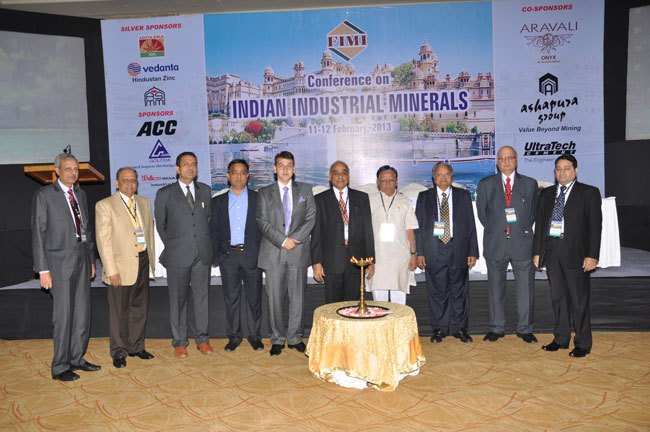Conference on Indian Industrial Minerals commences in Udaipur
A two days conference on Indian Industrial Minerals started today at Sheraton Palace Resort and Spa by the Federation of Indian Mineral Industries.

A two days conference on Indian Industrial Minerals started today at Sheraton Palace Resort and Spa by the Federation of Indian Mineral Industries.
In the conference, papers were presented on several subjects related to the development of mineral industries. Many individuals associated with the Mineral Industry from Rajasthan and Gujarat attended the event.
Papers on new technical developments in the field of minerals and mining, increase in the production of minerals, maintaining the competition and developing together were presented.
The conference was inaugurated at 10 am by Sudhansh Pant, Secretary of Mining and Petroleum Department, Government of Rajasthan.
As commented in the conference, “Udaipur, apart from being the ‘City of Lakes’, also happens to be the epicenter of mining activities in the State of Rajasthan. This, therefore, is the ideal location for this conference”.
The broad points presented in the conference were –
During the year 2011-12, the total production of industrial minerals (Including minor minerals) in the country was valued at Rs.24881 crores, which is 37.22% of overall mining (excluding fuel minerals) production. It can, this, be seen that industrial minerals constitute a very important and substantial proportion of the minerals production in the country.
India is rich in occurrence of many of the industrial minerals and has achieved 100% self-sufficiency in minerals like bauxite, barites, chromite, feldspar, fireclay, limestone, magnesite, rutile, sillimanite, silica minerals, talc, wollastonite etc. Many of these minerals are being exported substantially, e.g., barites, bentonite, dimension stones (granite etc.), feldspar, garnet (abrasive), ilmenite, mica, Sandstone, wollastonite etc.
India is also a heavy importer of many of the important industrial minerals or their value-added products. These include asbestos, ball clay, fluorspar, graphite, gypsum, limestone, magnesite, marble, rock phosphate, sulphur, potash etc. Due to shortage of trained man power it is not able to exploit its full potential. There is a need for an elaborate human resource development programme and capacity building for the sector.
Indian mining sector in general and the industrial minerals sector, in particular, needs to adopt mining practices which will minimize the environmental impacts from mining and related operations. Since a large proportion of mines in the industrial minerals sector are small mines, the regulatory atmosphere with respect to environment and forest clearances needs to be simplified to facilitate continued operation of these mines while motivating them to adopt scientific mining practices and ensure safety.
Moreover, industrial minerals are generally low priced commodities and mined in bulk compared to metals. Their economic viability is highly dependent on transport costs. A good infrastructure in the area can further boost their production.
FIMI has been conscious of the challenges facing this extremely important section of Indian mining industry and therefore this is an opportune time to deliberate on these issues and to, hopefully, get some way forward.
Rajasthan is one of the leading states in production of industrial mineral. It is one of the leading producers of gypsum, fluorspar, soapstone, marble, calcite/wollastonite, asbestos, rock phosphate, talc and feldspar.
To join us on Facebook Click Here and Subscribe to UdaipurTimes Broadcast channels on GoogleNews | Telegram | Signal


